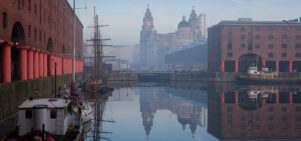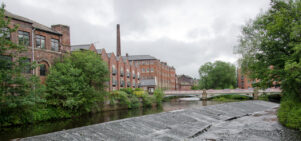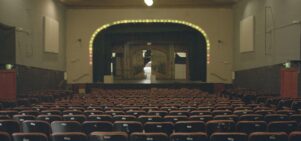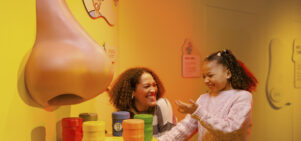Manchester Theatre Review: The Birthday Party
Julia CoultonHarold Pinter’s play about a sinister seaside boarding house is running at the Royal Exchange Theatre – but just what is it all about?
It’s great to see a play with no neat conclusions or easy answers; the kind that forces its audience to think. Harold Pinter’s The Birthday Party, playing at the Royal Exchange Theatre until July, does just that. Set in a drab seaside boarding house, the play centres on long-term resident Stanley Webber, a former concert pianist who can hardly rouse himself each morning for his daily cornflakes, and landlady Meg Boles, who spends much of the play fussing lovingly around Stanley and her husband, Peter. The first act sees Pinter’s keenly observed absurdities of their mundane routines played out with pitch black humour. Laughter soon turns to menace, however, when two men, Goldberg and McCann, turn up out of nowhere to stay. It becomes clear that the strangers know Stanley; for his part, he’s terrified of their sinister presence. A birthday party is held for the petrified Stanley, the like of which has never been seen before.
Towering performances are given from the whole cast. Maggie Steed is brilliant as Meg, Ed Gaughan’s Stanley is a quiet tour de force, and the evil Goldberg and his violent sidekick McCann are captured perfectly by Desmond Barrit and Keith Dunphy. Even the smallest lines are heavy with significance, and Pinter’s trademark pauses ratchet up the tension.
Even the smallest lines are heavy with significance, and Pinter’s trademark pauses ratchet up the tension
Pinter was inspired to write the play after staying in a dirty Eastbourne boarding house recommended to him by a man he’d met in a pub. Not interested in producing a play that would be immediately understandable, and fully aware of the negative audience reaction that could follow, Pinter imbues The Birthday Party with an air of mystery and fascination that enraged contemporary critics but would later make it one of his most popular works. Thankfully, the critics didn’t stop Pinter from allowing the play to lead to its inexorable, awful conclusion. As we were leaving the theatre, a woman asked, “Did you understand it? The acting was fabulous but there are six of us and we’re not sure what we’ve just watched.” If Pinter were around today, we’re sure he would be more than happy with that reaction. Long may his work continue to confuse and astound us.


















